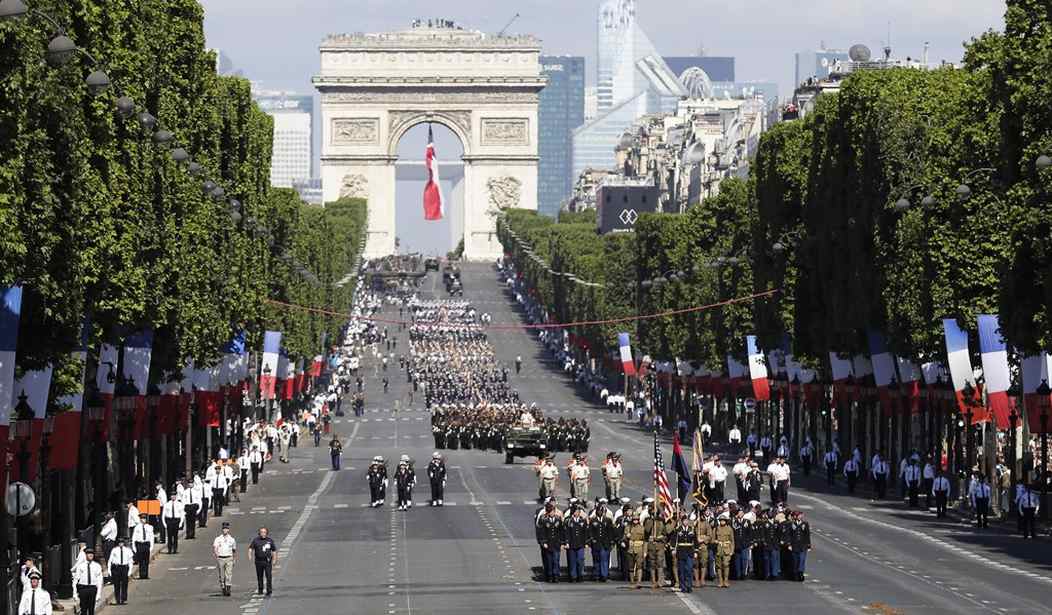The people of France celebrate July 14, Bastille Day, remembering a significant day during their country’s hideous 18th century leftist revolution, which guillotined or otherwise murdered pretty much anyone the revolution’s leaders—the misnamed Committee of Public Safety—wanted permanently “cancelled.”
However, for those who don’t want a “progressive” Reign of Terror to sweep across America like it did in France, today, July 28, is a much more appropriate anniversary to celebrate.
Here are just a few of the many reasons why.
In the summer of 1793, France’s Jacobin political club, which dominated the Paris Commune and for which a New York-based leftist magazine is grotesquely named, declared “terror the order of the day.” Committee member Jean-Nicolas Billaud-Varenne gloated, “In profiting from the energy of the people, we shall at last exterminate the enemies of the Revolution.” The president of the Commune, Pierre Gaspard Chaumette, who led the revolution’s effort to destroy Christianity, declared “Let us throw between us and them the barrier of eternity!”
Billaud-Varenne, also anti-Christian, proposed seizing property from the Catholic church, and subjecting the church and its teachings to the government. Certain that only his viewpoint was worth considering, he said, “a vile interest, seconded by a stupid ignorance, may still dare to rise up against so advantageous a reform; but its motives will be too contemptible for anyone to give ear to its clamor. The only cry to be listened to is that which takes for device Conscience and Truth.”
Lyons, a major industrial center in France, had been resisting the revolution, so in October, the Committee decreed: “The city of Lyons shall be destroyed. Every habitation of the rich shall be demolished; there shall remain only the homes of the poor . . . . On the ruins of Lyons shall be raised a column . . . with this inscription: ‘Lyons made war on liberty. Lyons is no more.”
Recommended
The first Committee member sent to oversee Lyons’ destruction, Georges Couthon, another enemy of the Catholic church, ordered the city’s inhabitants disarmed. Soon, Couthon’s task in Lyon was assumed by Committee member Jean-Marie Collot d’Herbois, an ex-actor, described by the late R. R. Palmer, Professor Emeritus of History at Yale, as a “vehement, emotional and vulgar man, craving the center of the stage, dramatizing and gesticulating and bellowing when excited,” like fake Tejano Robert Francis “Beto” O’Rourke. “The Jacobins have every virtue,” Collot declared. “They are compassionate, humane, generous; but they reserve all these feelings for the patriots who are their brothers.”
Collot was assisted by Joseph Fouché, an ally in Chaumette’s war on Christianity who became known as “The Executioner of Lyons.” For several days beginning on December 4 (14 Frimaire on the revolutionary calendar, the Committee having renamed the calendar to signal the revolution’s break with the past) about 360 Lyonese were killed by grapeshot fired from cannon or, if they survived the salvo, by being hacked to death with swords. Reporting the slaughter to the Committee, one of its operatives wrote “May this festival forever impress terror upon the souls of rascals . . . . [Y]es, festival is the word. When crime (opposition to the revolution) descends to the grave, humanity breathes again and it is the festival of virtue.” Another fanatic reported on one day’s murders, “What delight you would have tasted if you had seen, day before yesterday, the national justice (execution) upon two hundred and nine scoundrels (anti-revolutionaries). What majesty!”
The carnage underway, Collot departed Lyons for Paris. Fouché wrote him, saying “Tears of joy stream in my eyes and flood my soul. . . . This evening we send two hundred and thirteen rebels under the fire of the lightning bolt.” Over four months, about 2,000 Lyonese were murdered. Collot said, “Some men are disturbed when this or that other man disappears. ‘He gave a living to the poor,’ they say, (but) the poor will do without the rich.” Collot believed “the justice of the people must be as prompt as the expression of its will.”
Sounding a bit like Rahm Emanuel, who as the Obama administration’s chief of staff said “you never want a serious crisis go to waste,” the Committee’s first president, Georges Danton, said “we must know how to take advantage of the sublime impulse of the people.” But Danton later called for the Terror to be curtailed and accused the Committee’s leader, Maximilien Robespierre, of being a dictator. Proving Danton correct, Robespierre and fellow Committee member Louis-Antoine Saint-Just had Danton, some of his allies, and Committee member Marie Jean Hérault de Séchelles guillotined on April 5 (16th Germinal, on the revolutionary calendar), 1794. Saint-Just was a piece of work. The Terror’s “Angel of Death,” as a wayward young man he had written a vulgar “Organt, Poem In Twenty Cantos,” about on par with “Beto” O’Rourke’s Song of the Cow.
On June 10 (22 Prairial), the Committee passed a law denying “suspects” a public trial and the right to counsel. Leftists always hating Christianity because its followers consider God’s law above that imposed by leftists, on July 17, 1794, the revolution guillotined 16 Carmelite nuns, lay sisters, and externs who refused to discontinue their religious activities. In a display of incredible courage, the doomed women sang Salve Regina as they marched, one by one, to the scaffold. The scene is portrayed in this version of Francis Poulenc’s opera, Dialogues des Carmélites, with the role of the prioress, Madame Ledoine, Mother Teresa of St. Augustine, sung by the late, very great, Jessye Norman.
However, after 17,000 murders that they thought were just fine, the guillotining of the Martyrs of Compiègne was too much for the French. On July 28, 1794, Robespierre, Saint-Just, and Couthon fell to the “National Razor” they had wielded against others, ending the Terror. Today’s aspiring Jacobins would do well to remember.

























Join the conversation as a VIP Member